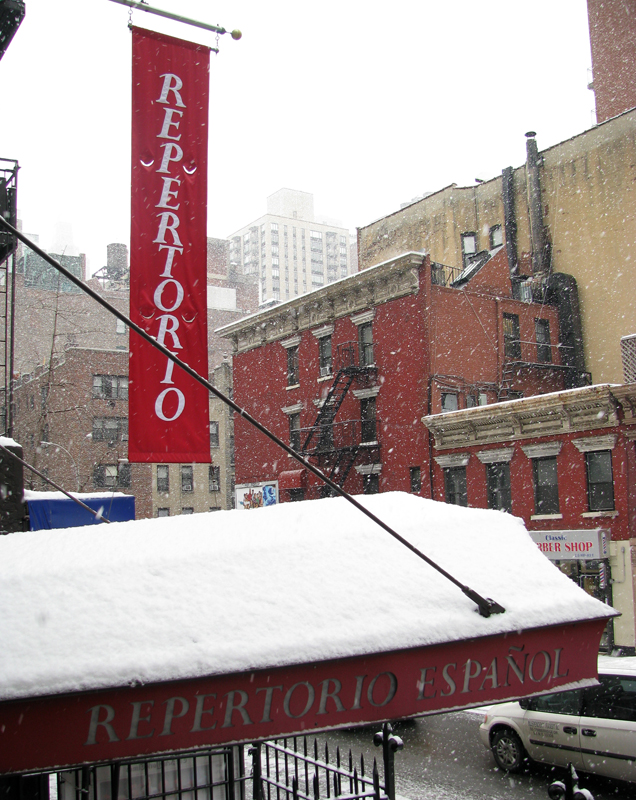CHC acquires Repertorio Español records
 In January, CHC Archivist Beata Bergen and Web Communications Technician Rudo Kemper traveled to New York City to inventory and pack up the records from the New York-based theater company Repetorio Español. In the midst of a snowstorm, we packed a total of 76 boxes, which include an assortment of records, photographs, promotional materials, correspondence, and other items that will become available to researchers for the first time. In January, CHC Archivist Beata Bergen and Web Communications Technician Rudo Kemper traveled to New York City to inventory and pack up the records from the New York-based theater company Repetorio Español. In the midst of a snowstorm, we packed a total of 76 boxes, which include an assortment of records, photographs, promotional materials, correspondence, and other items that will become available to researchers for the first time.
One of the oldest Hispanic theater companies in the United States, Repertorio Español produces Latin American, Spanish and Latino theater productions. It was founded in 1968 by two Cubans, the late producer Gilberto Zaldívar and artistic director René Buch. "We are very proud of Repertorio Español's artistic contributions to society since its founding in 1968," said Associate Producer José Antonio Cruz. "The Company's achievements have had a considerable influence in the preservation of Spanish and Latin American culture in the United States. In addition, its productions have made an unique contribution to the American theater field." When asked why the Company decided to donate its archive to the Cuban Heritage Collection, Cruz noted, "It is of utmost importance to have the Company's accomplishments preserved as an example for future generations of what may be achieved for the benefit of our Hispanic communities. Given Repertorio's founders' Cuban heritage, we couldn't think of a better place than CHC to bring context to what they have achieved through their tireless work at Repertorio Español."
After an initial visit to Repertorio's premises in July last year to assess and appraise the records, we are delighted to finally have this invaluable archive in our Collection and look forward to making it available to the public. The acquisition of the records of this historic theater company will serve to fortify our existing collection of Cuban and Latino theater and further promote scholarship in this field.
We were introduced to Repertorio in 2005 by Dr. Lillian Manzor, Associate Professor in the University of Miami's Department of Modern Languages and Literatures and Director of the Cuban Theater Digital Archive. We are extremely grateful to Repertorio Español, Mr. Zaldívar, Mr. Buch, Executive Director Robert Weber Federico, and Associate Producer José Antonio Cruz for trusting us with their legacy.
 For more information about CHC's theater collections, visit http://www.library.miami.edu/chc/collections/theater/ » For more information about CHC's theater collections, visit http://www.library.miami.edu/chc/collections/theater/ »
Back to top

Cuban Memories: The 50th anniversary of the Bay of Pigs invasion

This month marks the 50th anniversary of the Bay of Pigs invasion. Amongst our collections of personal papers, the Cuban Heritage Collection holds the papers of José Miró Cardona (1902-1974), received in 2003 as a gift from his son José Miró Torra. In 1961, José Miró Cardona was president of the Cuban Revolutionary Council (CRC), a coalition of anti-Castro organizations that worked with the administration of John F. Kennedy to plan the Bay of Pigs invasion. Miró Cardona resigned from the CRC in 1963 and taught at the school of law at the University of Puerto Rico until his death in 1974. His papers are an essential primary source for the study of the Bay of Pigs invasion and the early history of the Cuban exile community. The collection include 21 boxes of the administrative records of the CRC and 36 boxes of Miró Cardona's personal and professional papers.
Cuban exile invasion force Brigade 2506 led the Bay of Pigs invasion. On Saturday, December 29, 1962, Miami's Orange Bowl was the site for a ceremony honoring the surviving members of the invasion. The photograph above, from the Miró Cardona Papers, shows U.S. President John F. Kennedy at that ceremony with Brigade Commanders Manuel Artime next to him and José "Pepe" San Roman at the podium. José Miró Cardona is pictured at far right.
 View an online guide to the José Miró Cardona Papers » View an online guide to the José Miró Cardona Papers »
Back to top

Scholar Spotlight: Bonnie Lucero
 Bonnie Lucero is a Ph.D. candidate in History at the University of North Carolina at Chapel Hill and was in residence in the Cuban Heritage Collection in the summer 2010 as a Graduate Pre-Prospectus Fellow. Her research project is entitled "Post-colonial Peculiarities: Cultural Reflections of Race and Gender on the Road to Cuban Independence." During her residence as a Fellow, she viewed ample collection of materials related to Cienfuegos and Cuba during the American occupation at the turn of the 20th century. She particularly references the manuscript collections as being rich and fruitful for her purposes, though she also consulted a variety of journals and periodicals, maps and cartographic materials, and secondary materials. Bonnie Lucero is a Ph.D. candidate in History at the University of North Carolina at Chapel Hill and was in residence in the Cuban Heritage Collection in the summer 2010 as a Graduate Pre-Prospectus Fellow. Her research project is entitled "Post-colonial Peculiarities: Cultural Reflections of Race and Gender on the Road to Cuban Independence." During her residence as a Fellow, she viewed ample collection of materials related to Cienfuegos and Cuba during the American occupation at the turn of the 20th century. She particularly references the manuscript collections as being rich and fruitful for her purposes, though she also consulted a variety of journals and periodicals, maps and cartographic materials, and secondary materials.
During her research, Bonnie consulted the Gerardo Machado y Morales Papers, the Tomás Estrada Palma Collection, the Eva Canel Papers, the Teresa Verdaguer Papers, as well as the papers of several prominent cienfuegueros. Many of these documents provided a rare window into the political environment of Cienfuegos and the Santa Clara province at the turn of the twentieth century, while also casting light on the everyday private lives of prominent families from the area. She particularly singles out the Verdaguer collection as being invaluable for her dissertation: "this collection contained personal correspondence, diaries, journals, and genealogies which included the very historical figures and prominent politicians and notaries whom I had encountered in the provincial archive of Cienfuegos, Cuba. These materials provide a rare look into the personal lives, social networks and family histories of people who figure prominently as the creators of historical materials, and the political decision makers of Cienfuegos. Indeed, one of the notaries whose records I use in my dissertation, and one of the key politicians who worked in Cienfuegos under the Administration of military governor Leonard Wood in Cuba during the occupation appear in these records."
In addition to confirming the importance of the CHC for her dissertation, Bonnie's time in Miami proved to be a valuable personal experience as well: " I gained more than just a productive academic, investigative and professional experience in Miami. I was warmly welcomed by the staff and other fellows, and forged lasting friendships and professional connections during my work at the Cuban Heritage Collection. This experience made my brief stay in Miami doubly enjoyable and fruitful."
 Learn more about Bonnie Lucero's research. Learn more about Bonnie Lucero's research.
 Watch Bonnie Lucero discuss her research and experience at CHC. Watch Bonnie Lucero discuss her research and experience at CHC.
Back to top
|


 In January, CHC Archivist Beata Bergen and Web Communications Technician Rudo Kemper traveled to New York City to inventory and pack up the records from the New York-based theater company
In January, CHC Archivist Beata Bergen and Web Communications Technician Rudo Kemper traveled to New York City to inventory and pack up the records from the New York-based theater company  For more information about CHC's theater collections, visit
For more information about CHC's theater collections, visit 
 Bonnie Lucero is a Ph.D. candidate in History at the University of North Carolina at Chapel Hill and was in residence in the Cuban Heritage Collection in the summer 2010 as a Graduate Pre-Prospectus Fellow. Her research project is entitled "Post-colonial Peculiarities: Cultural Reflections of Race and Gender on the Road to Cuban Independence." During her residence as a Fellow, she viewed ample collection of materials related to Cienfuegos and Cuba during the American occupation at the turn of the 20th century. She particularly references the manuscript collections as being rich and fruitful for her purposes, though she also consulted a variety of journals and periodicals, maps and cartographic materials, and secondary materials.
Bonnie Lucero is a Ph.D. candidate in History at the University of North Carolina at Chapel Hill and was in residence in the Cuban Heritage Collection in the summer 2010 as a Graduate Pre-Prospectus Fellow. Her research project is entitled "Post-colonial Peculiarities: Cultural Reflections of Race and Gender on the Road to Cuban Independence." During her residence as a Fellow, she viewed ample collection of materials related to Cienfuegos and Cuba during the American occupation at the turn of the 20th century. She particularly references the manuscript collections as being rich and fruitful for her purposes, though she also consulted a variety of journals and periodicals, maps and cartographic materials, and secondary materials.






